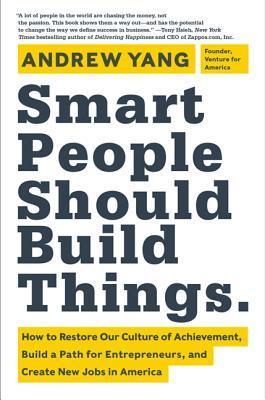Andrew Yang

The War on Normal People: The Truth About America's Disappearing Jobs and Why Universal Basic Income Is Our Future
Andrew Yang
From entrepreneur Andrew Yang, the founder of Venture for America, an eye-opening look at how new technologies are erasing millions of jobs before our eyes-and a rallying cry for the urgent steps America must take, including Universal Basic Income, to stabilize our economy. The shift toward automation is about to create a tsunami of unemployment. Not in the distant future--now. One recent estimate predicts 45 million American workers will lose their jobs within the next twelve years--jobs that won't be replaced. In a future marked by restlessness and chronic unemployment, what will happen to American society? In The War on Normal People, Andrew Yang paints a dire portrait of the American economy. Rapidly advancing technologies like artificial intelligence, robotics and automation software are making millions of Americans' livelihoods irrelevant. The consequences of these trends are already being felt across our communities in the form of political unrest, drug use, and other social ills. The future looks dire-but is it unavoidable? In The War on Normal People, Yang imagines a different future -- one in which having a job is distinct from the capacity to prosper and seek fulfillment. At this vision's core is Universal Basic Income, the concept of providing all citizens with a guaranteed income-and one that is rapidly gaining popularity among forward-thinking politicians and economists. Yang proposes that UBI is an essential step toward a new, more durable kind of economy, one he calls "human capitalism."

The Ping-Pong Queen of Chinatown
Andrew Yang
Perfect for fans of Ben Philippe and Mary H. K. Choi, this charming, insightful YA novel follows two high school students who form a complicated, ground-shifting bond while filming a mockumentary.
On the eve of Felix Ma’s junior year of high school, his parents hires a college admissions coach to help him find a marketable activity. Cynically trawling for extracurricular excellence, Felix decides to start a film club at school.
But then he meets Cassie Chow, a bubbly high school senior who shares Felix’s anxieties about the future and complicated relationship with parental expectations. Felix feels drawn to Cassie for reasons he can’t quite articulate, so as an excuse to see her more, Felix invites Cassie to star in his short film.
While the project starts out as a lighthearted mockumentary, at the urging of Felix’s college admissions coach, who wants to turn the film into college essay material, it soon morphs into a serious drama about the emotional scars that parents leave on their kids. As Felix and Cassie uncover their most painful memories, Cassie starts to balk at opening her wounds for the camera.
With his parents and college admissions coach hot on his heels, Felix discovers painful truths about himself and his past—and must decide whether academic achievement is worth losing his closest friend.

Smart People Should Build Things: How to Restore Our Culture of Achievement, Build a Path for Entrepreneurs, and Create New Jobs in America
Andrew Yang
Andrew Yang, the founder of Venture for America, offers a unique solution to our country’s economic and social problems—our smart people should be building things. Smart People Should Build Things offers a stark picture of the current culture and a revolutionary model that will redirect a generation of ambitious young people to the critical job of innovating and building new businesses. As the Founder and CEO of Venture for America, Andrew Yang places top college graduates in start-ups for two years in emerging U.S. cities to generate job growth and train the next generation of entrepreneurs. He knows firsthand how our current view of education is broken. Many college graduates aspire to finance, consulting, law school, grad school, or medical school out of a vague desire for additional status and progress rather than from a genuine passion or fit. In Smart People Should Build Things , this self-described “recovering lawyer” and entrepreneur weaves together a compelling narrative of success stories (including his own), offering observations about the flow of talent in the United States and explanations of why current trends are leading to economic distress and cultural decline. He also presents recommendations for both policy makers and job seekers to make entrepreneurship more realistic and achievable.